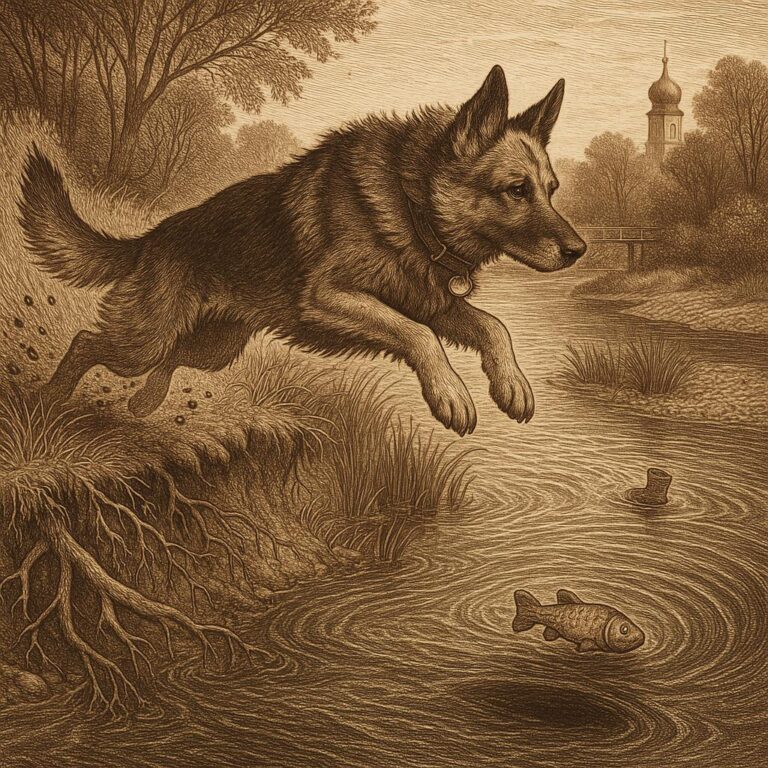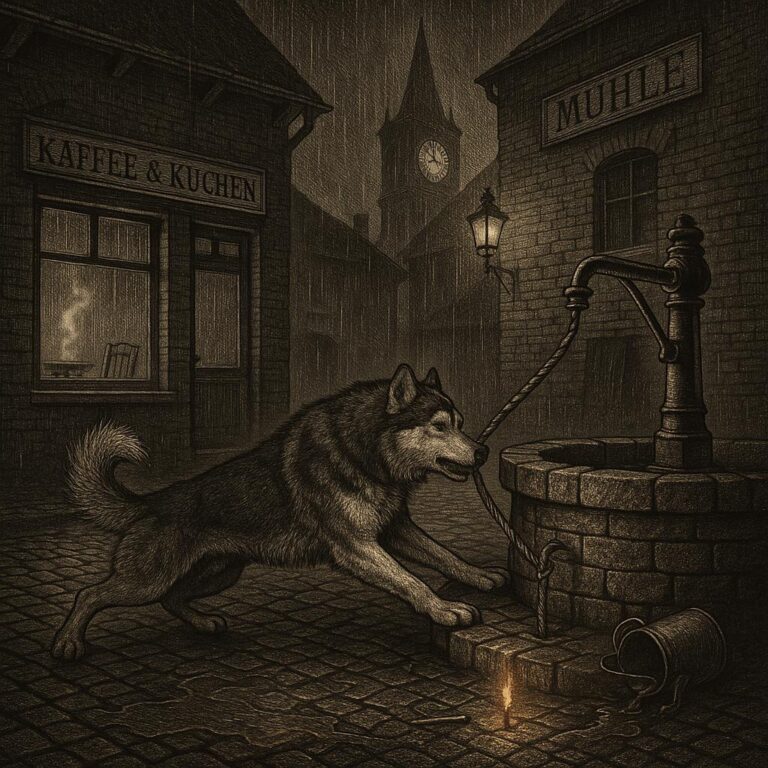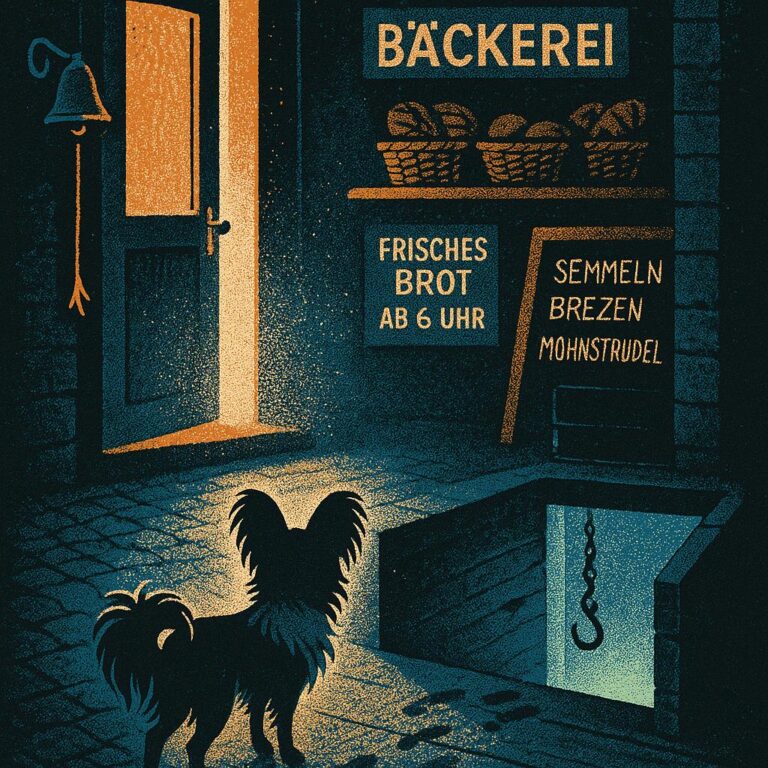When Letters Took Flight

Hushed bells shook the old stones as Kestrel, a Golden Retriever now fifteen years old, padded the cloister. Incense breathed through the arches, and he followed a thread of scent like a golden ribbon only his muzzle could see. Brother Mateo had vanished before lauds, and Kestrel felt the absence like an empty bowl. The old dog nosed the scriptorium door. Glyphs on a half lit page rippled, lifting like small birds. He whined, remembering younger paws, then stepped closer. The letters wheeled into a spiral and the door clicked behind him. From the dark stair, a voice whispered, „Kestrel?“
His ears pricked, a tremor traveling down to the tips of his paws. Old joints spoke to him—careful, careful—but the voice on the stair threaded through the ache.
He nosed the darkness. The stairwell smelled of damp stone and old wine, of beeswax tucked in the walls, of the iron ring Mateo wore at his belt. Ink and dust had their own weather here, a dry rain that held sunlight even when none fell. Kestrel stepped down. The air cooled. Behind him, the letters on the desk had lifted into a slow flight and then settled, their spiraling quieting into a single line.
“Kestrel?”
He knew the name of the one who said his name by the salt and thyme and clean wool of him. Mateo’s breath had changed—thin at the edges, a little frightened, like a rabbit caught but not yet resigned. Kestrel’s nails clicked once, twice. He paused to listen. The dark spoke in drops from the ceiling and the faintest church-mouse scurry. And there, a sleeve brushed stone.
He found him by touch before light. A knee, there. Cloth. A hand lay on the stair, palm up, smelling of oak-gall and penknife. Kestrel pressed his muzzle into it, warm and wet, and Mateo’s fingers closed with a gasp.
“Old friend,” the voice said, breath shivering his whiskers.
Kestrel leaned his shoulder against Mateo’s shin, the way he had when storms shook the bell tower and novices forgot their Lenten patience. Mateo sat, or slid, onto the step and breathed until the thinness filled, then tried to stand. The stair did something he did not expect—it did not go straight. It curled under their feet. Kestrel’s pads told him the story. The stones were worn in a circle, very slowly spiraling inward, like the shells he remembered being set at the saints’ feet in summer.
Brother Mateo had followed the spiral because the letters on the desk had taught his eyes to do so. The room had answered back with a staircase shaped to catch poets and faithful fools alike.
Kestrel turned outward. He knew out. He knew hearth from fog, cold from the smell of baking bread. He chose the colder edge, the way wind tasted when it came from windows rather than cellars. He placed each paw a little above the last and tugged with his shoulder against Mateo’s leg. Not hard. A reminder, a tide pulling toward shore.
Step by step in the curve of the world.
They came at length to a low arch. There was a door, but not like doors upstairs. It was painted with letters he could smell more than see—lampblack and milk, long dry. They held saints’ names and fields, harvest and longing, wrapped one into the next until even a monk could be lost inside them. Kestrel saw, with his nose and the memory of teeth around novice-rope, that the last letter of one line nudged the first of the next, like dogs that won’t stop playing at vespers. It made people move inward.
He set his forehead briefly against the wood, the way he put it against Mateo’s knee when the man grieved, and snorted. His breath fogged and slid the shortest way along the paint. It smelled of marsh rosemary and iron and the red earth behind the east wall where he had once rolled until Brother Hanno spluttered in three languages.
He stepped back, turned, and did what bodies understand when words confuse: he unwound. He walked the curve the other way. His tail, gone to plume long ago, brushed the paint. The gold hairs tugged at ink. He heard the tiniest crack as a seal no one knew was a seal remembered how to be a hinge. The door sighed.
Light, thin as milk-water, came along the floor from the scriptorium. Mateo made a sound that was neither laugh nor prayer. He wrapped fingers into Kestrel’s fur, a bookbinder’s knot, and together they climbed.
On the upper step, the room held its breath. The desk waited with one candle guttered to lace, ash arranged as careful as script. The spiral on the open page loosened, letters shouldering one another into lines again, like monks finding their places. The last of the night pressed its face against the high windows. Incense lived in the air from some earlier hour. Kestrel’s nose twitched at a thread of honey, a novice slipping a forbidden roll into an apron pocket. The world remembered itself.
Behind them the stair closed without malice. A grain of dust fell and was only dust.
Brother Mateo leaned his forehead to Kestrel’s neck and laughed that laugh that only came when he was caught and safe. He rub-scratched the spot where old scar met collar. “Saints bless you,” he whispered into the fur his own hands had brushed until they cupped his friend’s shape without looking. “Once more you fetch what I mislay.”
In the courtyard, the first bell for lauds tried its old throat. It shook the frost off the stones. Feet hurried in the corridor, a ripple of cloth, the soft thunder of voices that rise to prayer when they have been frightened.
They found them as Kestrel had left them: the old dog standing between the monk and the stair as if a river had diverted itself around them out of courtesy. Hands made signs over both, not quite sure which needed blessing most. There were exclamations, the taste of relief leaving sweat at the temples. The Abbot lifted Mateo’s chin with two fingers and looked into his eyes. He looked down at Kestrel, whose tail beat once, twice against robe and bench.
“He does not belong in the undercroft, and yet he is the one it answered,” someone said. “Perhaps the Rule we have is not the only rule that is written.”
They wanted to bustle, to hand-warm, to sit and cluck and fuss. Kestrel tolerated it a moment, then shifted and padded a little away. The candle-scent had changed; dawn was coming. He remembered other dawns. A boy had come with Mateo once, red-haired and freckled and serious as a winter sky, years and years ago. Kestrel had been all paws and mischief then, and had stolen the boy’s belt, running laps around the cloister until the whole place, God and all, seemed to laugh. That boy had become a man and gone away with pack and staff. The monastery had new boys now, but their laughter tilted differently.
Someone fetched water. Someone spoke words into brother’s ear that were meant to anchor. Mateo’s hand found him again. The knuckles were cool and nicked. A strip of blue ribbon lay on the desk, a bookmark cut from a margin no one would miss. Mateo threaded it under Kestrel’s collar and tied it with a clumsy bow. “For a knight,” he said.
Kestrel sneezed at the tickle. He blinked slow. The old ache in his hips spoke again. His paws felt full of river stones. He would go to the sun patch under Saint Jerome’s window; he always knew where it fell by the third bell. He began his small, careful walk there. The novices parted for him as if he were procession, touching two fingers to the top of his head when they thought no one saw.
The gardens beyond the cloister walk held their frost. Parsley dared a green. A cat blinked on the wall and did not hiss; this was not a morning for quarrels. Kestrel turned once before he lay down. The flagstones were warm enough now to remember summer. He let his chin slide to one paw. The ribbon ticked at his throat with each breath.
Mateo came and sat with his back to the pillar, one knee raised, both hands in his sleeves. The Abbot’s shadow passed and paused and did not break them apart. Bells spoke the hour steady and old, the way they had before Kestrel’s first winter and would after.
He had fetched Mateo out of the not-quite-words below. That was work enough for a morning. His eyes went heavy, lids like curtain cloth. He could hear, under everything, the whisper of letters settling where the copyists asked them to live, a shoal of small birds coming to roost.
Once, not now but near now, in some other morning braided to this one, Kestrel had run until his breath tore silk ribbons out of the wind and his legs had been light as water. He could find that thread if he needed it. For now, Mateo’s hand lay on his ribs, warm as bread, and the air carried lemon and chalk and wool and the brief electric crackle of new fire, and his name had been said with love.
He slept.
Sometime in that long, bright, bell-crossed sleep, a shadow crossed the sun patch and moved on. When he woke again, it was smaller. He stretched, an old cord gently tugged. The blue ribbon had slipped to the stone. He nosed it. The knot had loosened, nothing more.
Brother Mateo bent and took the ribbon up and slid it into his sleeve. He smiled the way people do when they are holding two things at once, one too sweet for tears to manage. “Come,” he said softly, for habit more than need. “We have work—quiet work.”
Kestrel rose, because rising was what his body knew secrets wanted. He walked beside Mateo as the man went to the scriptorium to make the letters into small obedient birds again. Outside, the cold gave way to a slow warmth. The cloister, old as prayer, held them both.
At the doorway, he stopped to press his nose to the lower post. He breathed in the place where wood met stone, the hinge that remembered a hinge. No whisper answered, no trick of paint pulled at him. The world had shut its secret without malice.
He turned, followed the thin thread of Mateo’s heel scent along the floor, a ribbon only his muzzle could see, and knew, as surely as he knew the sun’s patch and the hour of soup, that he would follow it wherever it led until both threads unspooled into light. The bells shook the stones, not hushed now but joyous, and the old dog stepped into their music, his work finished and, in finishing, begun.






